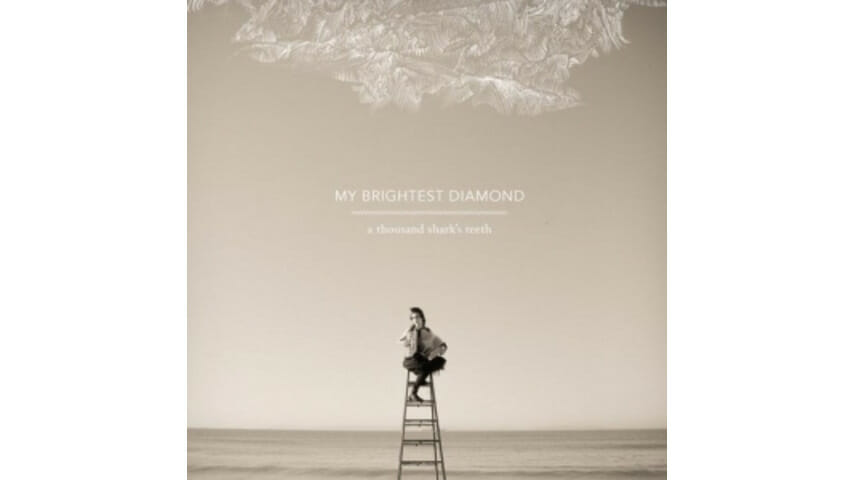
Brooklyn singer/songwriter/arranger makes case for sending indie-rockers to conservatory
My Brightest Diamond’s Shara Worden not only writes and performs her own songs, but she ups the ante by crafting her own string arrangements, producing and co-engineering her own recordings, and singing convincingly enough in French to emote like Edith Piaf. The classically trained singer also has an awe-inspiring, shape-shifting voice, a degree in opera, and a stage-informed approach to costuming and performance personas.
Not bad for a cheerleader. A cheerleader, that is, in Sufjan Stevens’ Illinoisemakers, where Worden backed the ambitious indie-popster, lending him the string section she’d assembled to perform under the My Brightest Diamond banner. But on A Thousand Shark’s Teeth, her second album, Worden is set to emerge from Stevens’ prodigious shadow and gain a fawning cult of her own.
That My Brightest Diamond bears the influence of smart, classically informed pop provocateurs like Björk, PJ Harvey, Kate Bush and the late Jeff Buckley doesn’t make Worden’s project noteworthy; plenty of lesser artists mine similar terrain. What makes My Brightest Diamond distinctive is that the music stands as a worthy addition to this roll call of heroes—there’s never the impression of an inferior, second-generation copy. And putting aside claims of influence, since when has anyone conjured anything actually sounding like Grace-era Buckley? My Brightest Diamond comes very close.
On its 2006 debut, Bring Me The Workhorse, My Brightest Diamond went for the jugular, a vocal whoop deployed like a cannon shot on “Golden Star” and a detuned guitar fizzing and crackling through ominous rocker “Freak Out.” But A Thousand Shark’s Teeth—having been originally conceived as a strings record—aims more for beauty than attention-grabbing. On opener “Inside A Boy,” Worden startles by holding nothing back when she hits the apogee of the vocal line, but aside from that moment, your champagne flutes are safe around the speakers.
Since the songwriting largely eschews verse-chorus-verse pop structure, Shark’s Teeth may be understood as a trip into the more classical side of Worden’s muse. That’s not to say there are no pop precedents—Björk’s Vespertine and, at times, Homogenic come to mind in the use of non-repeating lines and sections, and the substitution of strings, harp or marimba where a guitar would go in more conventional rock-band arrangements.
My Brightest Diamond’s debut packed an emotional wallop, delivering the audio equivalent of an ecstatic flying dream in “Dragonfly” and knocking attentive listeners sideways with the death-lamenting gut-punch of “The Robin’s Jar.” While Shark’s Teeth traffics in the same sort of magical realism, the mood is less blood-and-guts—“We took you to the doctor / He said, ‘it’s a bad one / And it’s such a shame about it’” (from “Something of an End”)—and more tranquil reflection, as exemplified by “Apples,” which offers the mundane observation, “sometimes on Saturdays/ When it’s raining we do laundry.” Laundry gets a mention in “Bass Player,” as well.
Given Worden’s skill as a vocalist and arranger, it seems My Brightest Diamond is at its best when Worden writes from a raw, wounded place. Her gifts are better employed getting under listeners’ skin than feeling comfortable in her own.
There are songs that induce chills here, both musically and lyrically, becoming far greater than the sum of their parts through the cunning by which they’re assembled. “To Pluto’s Moon” adopts the metaphor of astronomical distance in order to grapple with relational distance, seemingly brought about by death. It begins, appropriately enough, with a delicate vocal cloud and harp arpeggios, and ends on repeated fifths of distorted guitar.
“Black & Costaud”—sung alternately in French and English—relies on Sebastian Krueger’s multi-tracked clarinet (and arrangement) for its unsettling mood of ominous glee. The song, which borrows its lyric from the Maurice Ravel opera L’enfant et les sortileges, paints the picture of a destructive child suddenly confronted by a teapot that decides to hit back. It’s exactly the sort of world one would expect to exist in My Brightest Diamond’s Lewis Carroll universe. You’d be well advised to head straight down the rabbit hole.